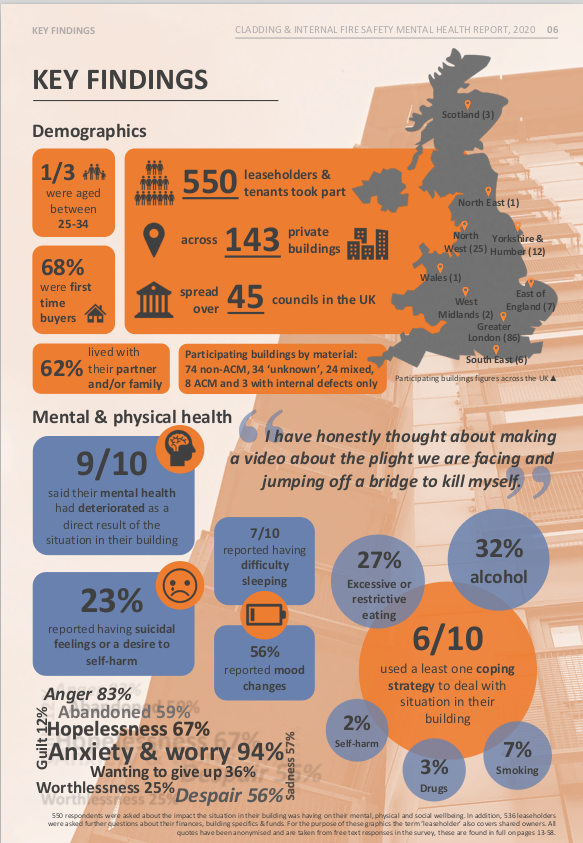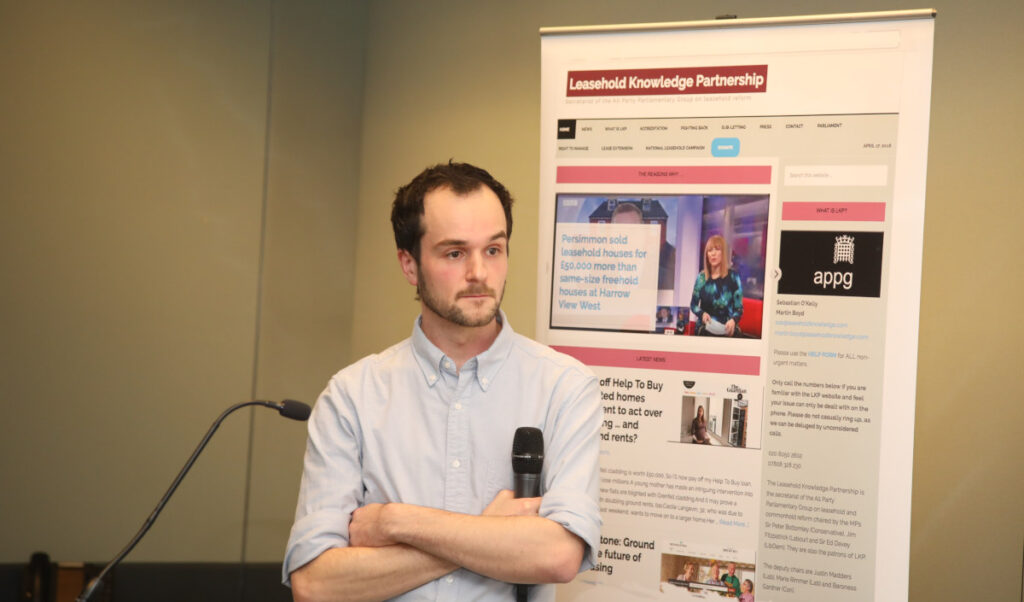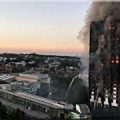
By Martin Boyd
LKP chair
Nearly a quarter – 23% – of all leaseholders in cladding sites have considered suicide or self-harm, according to a survey by the UK Cladding Action Group.
Compiled by Will Martin (pictured below), a hospital doctor, the survey involved responses from 550 leaseholders. It shows the appalling impact cladding has had on the lives of those living in an ever-growing number of tower blocks deemed to have dangerous cladding.
A full copy of the report can be read HERE
 Loading…
Loading…
The report was carried out over a number of months with input from 550 respondents, covering 143 blocks in 45 different local authorities. 68% were first-time buyers and 33% were under 34 years old. Almost 40% of respondents reported not living with a partner of family.

90% reported their mental health had deteriorated
80% reported their relationships had been affected
70% had sleep problems
60% have had needed to develop coping strategies
56% have had mood swings
46% were planning to seek medical help
35% said existing health conditions had been aggravated
32% had increased their alcohol consumption
27% had a new formal medical diagnosis
27% of respondents reported suffering from food disorders
25% had time off work
23% have had had suicidal feelings or self-harmed
7% had taken up or returned to smoking
3% had taken up drugs
3% had ended their relationship with partner but still had to live together
2% had self-harmed
26% reported a loss of libido
As we approach the three-year anniversary of the Grenfell tragedy in a few days time it seems appalling that the cladding crisis still impacts so many people. Instead of the number of dangerous cladding blocks declining over the last three years the numbers have gone up.
Originally it was only ACM blocks that were seen as dangerous. Now as the result of a change of mind by the Housing Department and its expert advisors the number of impacted blocks has increased enormously.
There are approximately 450 ACM blocks spread across the social sector of which 208 are private residential blocks with the remainder being made up of social housing blocks, student accommodation, and hotels.
Of the private blocks, just 28 have completed their remediation after three years. The estimate is that with the addition of new forms of cladding we are now looking at thousands of blocks with some estimating that over half a million homes are impacted.
It remains unclear to LKP how the government could not have known this problem would occur and the stress that leaseholders would suffer. Throughout we have heard words like “its a complex issue” but at no point does the urgent approach urged by the Chair of the Grenfell inquiry seem to have been adopted.
LKP had warned officials at the end of 2018 that there was a growing problem with insurance. A problem which now means those who might be able to carry our remediation work now find it difficult or impossible to obtain professional indemnity cover. Those living in these blocks now face huge increases in their building’s insurance or in extreme cases find it impossible to find cover.
It is little wonder that leaseholders find themselves hugely stressed by the position they face and yet the Association of British Insurers has just assured the MHCLG Select Committee Inquiry looking at cladding that:
“Buildings insurance is widely available, highly competitive and the market is working as it should”
Like many others, the ABI offers its sympathy but little else
“While we are very sympathetic to the issues some leaseholders are facing we strongly believe that the ultimate solution is for the dangerous cladding to be remediated as quickly as possible.”
There seems little hope of change in the near future while everyone seeks to blame everyone else while passing the bills to the leaseholders.
“This is a crisis resulting from over twenty years of inadequate building safety regulation.”
National Fire Chiefs Council
UKCAG press release
CLADDING MENTAL HEALTH ‘CRISIS’ GROWS AS ONE IN FIVE LEASEHOLDERS HAVE EXPERIENCED SUICIDAL THOUGHTS OR DESIRE TO SELF-HARM, NEW SURVEY REVEALS
One in five leaseholders embroiled in the cladding scandal currently afflicting residential blocks across the country have had suicidal thoughts or felt a desire to self-harm.
A survey carried out by the UK Cladding Action Group (UKCAG) supported by Inside Housing reveals nine out of 10 residents living in affected buildings have seen their mental health deteriorate as a result of issues with the cladding on their block.
Of the 550 respondents to complete the survey, 22.5% reported having suicidal feelings (14.5%) or a desire to self-harm (8%).
Inside Housing, UKCAG and other leasehold and cladding campaign groups continue the End Our Cladding Scandal campaign, which is calling on the government to fund the removal of dangerous systems from all buildings.
The revelations around the hidden mental health crisis playing out within the country’s residential blocks come two days before the third anniversary of the Grenfell Tower Fire. The ACM cladding on the block was seen as a key factor in the spread of the fire that tragically killed 72 people.
There are still 262 private and social residential blocks with ACM cladding systems. It is estimated that 1,700 buildings across the country currently have some form of dangerous cladding that need replacing, with many residents in these blocks living in constant fear for their safety or facing huge bills, in some cases as much as £65,000 per flat, to remove the cladding.
The survey, which received responses of 550 residents representing 143 private buildings, showed 77.8% of residents say their mental health has been “hugely affected” by the cladding issues.
Just over a quarter (26.9%) said they had received a new formal diagnosis since becoming embroiled in the cladding scandal, 20.3% being diagnosed with anxiety disorders and 17.6% receiving depression diagnoses.
Nearly half (46%) had sought or were planning to seek medical help with mental health issues, while 1 in 4 had said they had taken time off work or study due to issues relating to the fire safety issues in their block.
A total of 32% of residents said they had turned to alcohol to help cope with the stress, 27% had used excessive or restrictive eating as a coping mechanism.
The new survey also reveals that the COVID-19 crisis has exacerbated many of the problems faced by leaseholders, particularly around future finances.
In a follow up survey 126 leaseholders 84.9% reported increased financial concerns given their building’s current situation and the potential for an economic recession. Just under half (45.2%) said that their financial concerns increased due to the fact they were out of work or uncertain about future employment.
William Martin, a member of the UKCAG and a resident of an affected building in Sheffield, said:
“Today’s report provides a shocking glimpse of what life living in an unsafe building is really like 3 years on from Grenfell. Respondents speak of their thoughts of suicide, of their constant insomnia and of their personal battles with mental health.
“What unites all of them, is a deep feeling of injustice. Each life is on hold; and given the sheer number of unsafe buildings and current pace of remediation, this ‘hidden’ mental health crisis is only set to get worse.
“Covid-19 has delayed remediation works further, has seen residents being asked to stay home in unsafe buildings and at time of financial difficulty for all has seen leaseholders continue to receive demands for extortionate sums of money to fix a problem they did not create.”
“Today’s report must act as a wake-up call. All leaseholders must be protected from all costs, more must be done to quicken the pace of remediation, and adequate care and guidance given must be given to those suffering. To hesitate further will only exacerbate the scale and severity of the problem.”
The End Our Cladding Scandal campaign was launched in May 2019 and calls on the government to fund the remediation of all blocks with dangerous cladding, without any costs being passed onto leaseholders.
The survey of residents, which covers blocks in 46 local authority areas in England, Wales and Scotland, show that fire safety issues have had a major impact on leaseholder’s finances. One in 10 (9.7%) have had to take out a loan with their family or a bank to cover costs, 62.7% have had to put family holidays on hold and (28.7%) feel they cannot start a family.
Despite promises from ministers that leaseholders would not pay, half (51.1%) have seen service charges go up and 9.1% have seen their block collectively pay more than £200,000 so far on fire safety related issues.
Quotes from the Survey
- “I’m in an at risk group…I have stress induced rheumatoid arthritis, I’m trying everything I can to try and take my mind off the problem so I don’t end up in a wheelchair again but it’s so difficult.”
- “I have had months of anxious and broken sleep, felt deep regret at having bought this place and have suicidal thoughts at least twice a week. I feel like I have been robbed.”
- “I have honestly thought about making a video about the plight we are facing and jumping off a bridge to kill myself. I struggle each day to keep myself alive.”
- “I hate coming home, I hate living here. This whole mess has given me a lot of anxiety and I am severely distressed. The government are the only people with the power to solve this.”
The survey also reflects the growing number of people that have been made “mortgage prisoners” in their blocks, as an increasing number of banks refuse to lend to prospective buyers on blocks with potentially dangerous cladding. Just over a third (34%) said they had difficulties selling their home due to fire safety issues, while (35%) said they had difficulties switching lenders.
The government has so far committed £200m to the removal of Grenfell-style ACM cladding from private residential blocks. However, a year after the fund was announced there are still 180 private residential blocks with ACM cladding and only 9 out of 94 buildings in scope for the fund have been approved for full costs.
As part of the March Budget, chancellor Rishi Sunak announced that he would be setting up a fund worth £1bn to remove dangerous non-ACM cladding from buildings over 18m.
However, the government confirmed last month that this would only cover approximately a third of all buildings covered in this type of cladding and those buildings that had already committed funds to remedial works would not be recompensed. Money will also be issued on a “first come, first served basis”, meaning many blocks are in the hands of their freeholders over whether they will be able to access money.
In a survey carried out after the fund was announced, 25% of people said they did not think they would benefit from the new fund, while 55% said they were unsure whether they would benefit.





 Radius leaseholders rumble Taylor Wimpey for trying to flog off freehold to property punters …
Radius leaseholders rumble Taylor Wimpey for trying to flog off freehold to property punters …





















